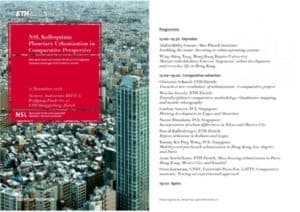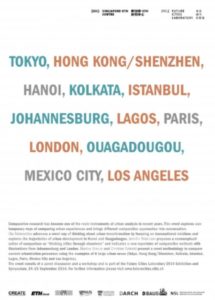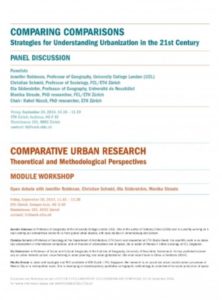The New Metropolitan Mainstream
Research Project
Future Cities Laboratory Singapore, Module V: Urban Sociology
Naomi Hanakata, Pascal Kallenberger, Ozan Karaman, Anne Kockelkorn, Lindsay Sawyer, Christian Schmid, Monika Streule, Rob Sullivan, Tammy Wong
The last two decades have seen a sharp increase in the speed, scale and scope of urbanization that has fundamentally changed the character of the urban areas. Transcending various physical borders, political jurisdictions and social spheres, urbanization has become a planetary phenomenon. While it is often assumed that this phenomenon leads inexorably to uniform and undifferentiated cities, evidence shows that it also gives rise to surprising forms of difference, diversity and variation within and between urban areas. This simultaneous proliferation and diversification of urban forms has important implications for urban planning and design. In the first instance, it demands a more supple conceptual framework that can both hold the processes of planetary urbanization and remain sensitive to the diversifying local manifestations. While many urban studies have examined particular cases in this emerging situation, a comparative and synoptic approach that captures both global and local dimensions is still lacking.
This module aims to redress this lack. It not only analyses the emergence of new urban forms, but elaborates the processes of urbanization to explain how general tendencies are materialized in specific places. Methodologically, the module is structured around comparative analyses of patterns and pathways of urbanization. Nine metropolitan areas are examined as case studies: Tokyo, Hong Kong / Pearl River Delta, Singapore, Kolkata, Istanbul, Lagos, Paris, Mexico City, and Los Angeles. It will do so by: first, developing a methodological framework for comparative analysis; second, analyzing the mechanisms and differences of planetary urbanization and establishing a typology of contemporary urbanization processes; and, third, examining the range of possible urban development models and exploring their practical implications. Special attention will be given to the analysis of urban potentials and the framing of possible strategies for a sustainable urban development.
New article
Towards a new vocabulary of urbanization processes: a comparative approach.
Schmid, Christian, Karaman, Ozan, Hanakata, Naomi, Kallenberger, Pascal, Kockelkorn, Anne, Sawyer, Lindsay, Streule, Monika, Wong, Kit Ping (2017) Towards a new vocabulary of urbanization processes: a comparative approach. Urban Studies 55.1: 19–52.
NSL Kolloquium Herbst 2016:
Planetary Urbanization in Comparative Perspective
November 11, 2016, 13:00 — 19:00

It is a great pleasure to announce the upcoming NSL Kolloquium which offers the great opportunity to meet two exceptional scholars and researchers in urban studies: AbdouMaliq Simone and Wing Shing Tang. In the second part of the event we will present in detail our comparative research project that we conducted in the last five years in the framework of the ETH Future Cities Laboratory Singapore. We are looking forward to sharing with you an afternoon full of interesting insights and debates.
Christian Schmid, Urban Sociology, Department of Architecture, NSL, ETH Zurich
Planetary Urbanization
In the last decades, urbanization has become a planetary phenomenon. Urban areas expand and interweave, and novel forms of urbanization emerge. In this process, new urban configurations are constantly evolving. Therefore, an adequate understanding of planetary urbanization must derive its empirical and theoretical inspirations from the multitude of urban experiences across the various divides that shape our contemporary world. Urbanization has to be considered an open process, determined as much by existing structures as well as by constant innovation and inventiveness. This NSL Kolloquium presents different research perspectives on recent urban developments.
Keynotes
AbdouMaliq Simone is an urbanist and research professor at the Max Planck Institute for the Study of Religious and Ethnic Diversity and visiting professor of sociology at Goldsmiths College, University of London. He has worked for three decades with practices of social interchange, cognition, local economy, and the constitution of power relations that affect how heterogeneous African and Southeast Asian cities are lived. His work deals with a multiplicity of propositions and capacities for relationships that remain untapped in popular districts across urban Asia and Africa, even though they are deployed everyday.
Wing Shing Tang has a Ph.D. from the University of Cambridge, England. He is a professor at the Baptist University of Hong Kong where he teaches Urban Geography and Planning. His research is on globalization and Chinese cities, urban planning in Hong Kong, Shenzhen, Guangzhou, Shanghai and Beijing. He engages, beneath other approaches, with Henri Lefebvre’s theory of the production of space. In his talk he argues that Hong Kong has a distinguishable path of urbanization inflicted by British colonialism, yet in a space regulated by the Chinese spatial administrative hierarchy of town-within-country and customary land practices.
Comparative Urbanism
The second part of the colloquium presents an encompassing insight into the work and the results of the research project Planetary Urbanization in Comparative Perspective conducted in the framework of the ETH Future Cities Laboratory Singapore. It is a comparative study of urbanization processes in eight large metropolitan areas across the world: Tokyo, Singapore, Hong Kong / Shenzhen / Dongguan, Kolkata, Istanbul, Lagos, Paris, Mexico City, and Los Angeles. According to the broad sample of cities brought together in this research, a specific methodological design was applied mainly based on qualitative methods and a specifically developed method of mapping. The main goal of this project is an analysis and comparison of the variegated patterns and pathways of planetary urbanization in order to develop a new vocabulary that allows a better understanding and apprehending of the contemporary urban condition. In the course of this project, which is now in its final stages, the research team developed a series of new categories of urbanization. It will present and discuss the following categories: popular urbanization, plotting development, bypass urbanism, multilayered patchwork urbanization, incorporation of urban differences, and mass housing urbanization.
Research team: Naomi Hanakata, Pascal Kallenberger, Ozan Karaman, Anne Kockelkorn, Lindsay Sawyer, Christian Schmid, Monika Streule, Rob Sullivan, Tammy Kit Ping Wong
Registration by 3. November: Claudia Gebert, gebert@nsl.ethz.ch
Detailed information: The NSL colloquia are a bi-annual presentation of exceptional work under a rotating theme determined by the inviting professor.


Friday, September 26, 2014 – ETH Zürich
Panel Discussion:
Strategies for Understanding Urbanization in the 21st Century
Module Workshop:
Theoretical and Methodological Perspectives
The event consits of a panel discussion and a workshop and is part of the Future Cities Laboratory 2014 Exhibition and Symposium, 24–26 September 2014. For further information please visit www.futurecities.ethz.ch
Comparative Urbanisms – Research Conference Singapore – 7 February 2013
Planetary Urbanization – Summer School – 9 July 2012
Planetary Urbanization – Research Conference – 30–31 January 2012
Program_Planetary-Urbanization12




